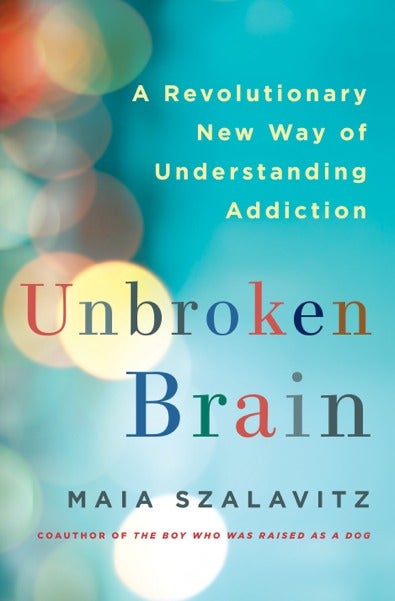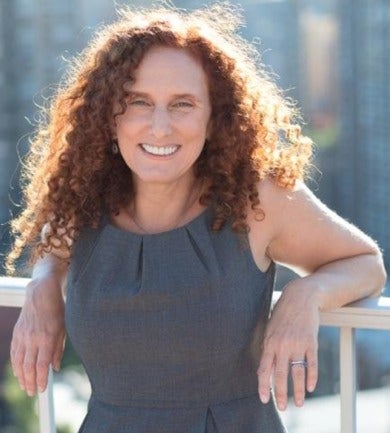
When Saturday Night Live aired a skit this weekend riffing on America’s new heroin epidemic—a satirical fake ad for “Heroin A.M.” to help addicts remain productive while using—many people weren’t laughing. That’s because heroin and other powerful opiates are killing more people than ever, across all demographics. So much for the War on Drugs. Maybe that approach is failing because we’re thinking about addiction all wrong.
In her new book, Unbroken Brain: A Revolutionary New Way of Understanding Addiction, journalist Maia Szalavitz argues that a better way to understand addiction is to view it more as a developmental disorder, like autism or dyslexia. Only then can addiction be effectively prevented and treated.
The book is a skillful mix of science, reporting, and personal memoir, drawing not just on 25-plus years of research on addiction and Szalavitz’s extensive reporting, but also her own experiences as an addict in her early 20s, when she was shooting heroin and cocaine as many as 40 times a day. (You can read an excerpt from the book here
Gizmodo: The central thesis of your book is that addiction is more like a learning disorder than a disease. What do you mean by that?
Szalavitz: When I say that addiction is a learning disorder, I don’t mean that it is any less medical. Addiction cannot happen without learning, because learning shapes values over the course of development. If you don’t learn that the drug comforts you or creates pleasure, you cannot become addicted. So on a very basic level, addiction clearly involves an aberrant form of learning. I don’t know a single scientist who would disagree with that, although they prefer to frame it as a disease rather than a disorder. Over time I have had many, many fights with people over the disease model [of addiction].
For me, very early in recovery, it was important to realize that I did not choose what happened. But I also understood that I did make choices over the course of my addiction. It’s more like your will gets impaired, not eliminated. It’s like what happens when you fall in love with a person and your whole sense of what’s important and what’s valuable shifts. The way the brain determines what’s an important goal changes during addiction. Now you prioritize drugs, but that doesn’t turn you into a monster. It just makes you a person who is undergoing a specific form of stress.
http://www.amazon.com/Unbroken-Brain...
Learning isn’t brain damage. You can learn to be an addict, but that doesn’t mean your brain is broken, or that you have a progressive disease that is going to get worse over time. In fact, the data on addiction shows that as you get older, you are more likely to recover.
That contradicts the common saying, “Once an addict, always an addict”—one of the myths you’re trying to dispel in your book. Why?
Szalavitz: Somebody may find that useful for their own recovery, but there is research suggesting that people can outgrow ADHD and even autism, although the latter is contested. Like, what do you mean by “outgrowing” autism? The same thing can be said of addiction. Yes, it did “rewire” your brain, and that is always there, just like your first love is always there in your head. But that doesn’t make you forever incapable of controlling your behavior around any addictive substance. And it varies by individual; not every addict is the same. Some people come into addiction because they are very impulsive or don’t feel things very strongly, so they want intense sensations. Others become addicts for the opposite reason: they are oversensitive and want to numb themselves.

What was it you were seeking from drugs?
Szalavitz: I have always been really over-sensitive to noises, tastes, textures, sounds, and light—pretty much any sensory input, I will experience that intensely. Heroin is really good at chilling all that out. Plus I hated myself, and I couldn’t connect with people. I felt so different and unloveable, but when I was on heroin, I felt safe, warm, comfortable, loved.
There are also people who find opiates distasteful: they get nauseous, feel numb or dizzy. Don’t think heroin addicts are getting some kind of extra bliss that nobody else is getting. We turn to heroin because we are missing something. That’s not to say I didn’t enjoy the euphoric parts, but the thing that kept me hooked was feeling safe and loved.
Another myth you mention in the book is the notion of hitting bottom—that recovery starts when an addict suffers so much, it brings about a piercing moment of clarity. But my sense is that many addicts use the phrase more as a metaphor.
Szalavitz: That is exactly what it is. It is not a medical concept, it is a story of sin and redemption. I have framed my own experience that way in the past, because it is like this beautiful moment of insight, and then everything changes. The problem is this underlying idea that if addicts have really horrible, negative things happen to them, it will somehow fix them. Addiction is defined as [engaging in] compulsive behavior despite negative consequences. You will end up with people dead that way. The idea of hitting bottom may be useful in a spiritual narrative, but it is not useful in a medical way. If you need to cut an addict out of your life for your own protection, you should absolutely do that. But don’t expect that to “cure” their addiction. Don’t expect that to help them. It might even harm them.
People are always going on about how bad denial is, but we couldn’t live without denial. We would be obsessed with death every second. The idea that we need to get rid of rationalization and denial and other [psychological] defenses leaves people helpless. There are things that are good in one context and bad in another. An opoid drug might be life-saving for someone in severe pain, and might kill someone with a serious addiction, but it is the same drug. We need to be able to see that complexity.
We demonize addiction to opiates in this country, and it affects how we treat people who suffer from severe chronic pain. They are often accused of being drug addicts when they go the ER, when they are really just seeking relief.
Szalavitz: It just breaks my heart, and makes me feel horrible that anybody in chronic pain would be made to suffer because people like me exist. The research shows that for people in their 30s and 40s who do not have a past history of addiction, the odds of becoming an addict during pain treatment are in the single digits. Seventy-five percent of opoid drug addicts are getting their drugs from someone else—not from their own prescription. That’s not to say people can’t become addicted during pain treatment. We need to be sensible about this. But we also need to recognize that it is not appropriate to deny somebody a drug that offers them relief, just because somebody else might abuse it.

I spoke recently with Robert Newman, the grandfather of methadone [treatment]. His idea is that if you come into the ER and you just want a dose of methadone or Suboxone—in other words, you want to avoid being in withdrawal—let’s just give it to you. Let’s not make you pretend that you’re in pain. This would, I believe, get more people into treatment with medication, and also reduce the often adversarial relationship between patients and doctors over these medications.
It also breaks my heart when I hear pain patients talk how how badly they were treated because [ER personnel] thought they were addicts. If we are to believe that addiction is a disease, why do we treat the people who are addicts like scum?
So what needs to change in terms of our drug polices, and how we prevent and treat addiction?
Szalavitz: We need prevention programs that have different approaches for different problems. If a kid’s problem is impulsively, it needs to be treated differently than a kid who suffers from anxiety. Prevention should be focused on coping skills and mental health—not on “Just say no.” We should focus on the 10 to 20 percent of people who try drugs who become addicts. What is different about them, and how do we help them avoid that? Because you are never going to prevent teenagers from doing dumb stuff.
We need to remove the shame and humiliation from treatment. One thing I like about seeing addiction as a learning disorder is that you can reframe treatment as education. Sometimes the best way to treat addiction is to treat the other stuff around it, especially for people coming from complex, traumatic situations. You might need to teach them new coping skills before they are capable of stopping drugs.
In terms of policy, criminalization makes no sense. We have a condition that is defined by the existence of punishment. We should legalize marijuana because it is the least harmful drug, and we should consider different policies rationally based on the risks and benefits associated with [specific] drugs. For example, psychedelics have some significant benefits, and we should be able to take advantage of those while minimizing the risks. We need a drug policy similar to how the FDA evaluates whether a medical drug is safe and effective enough to be [prescribed].